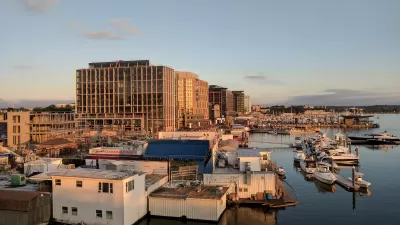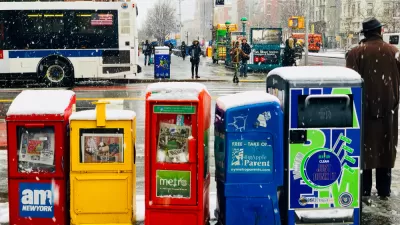Since the passage of The Telecommunications Act of 1996, media activists have been warning that a combination of consolidated corporate ownership of media outlets and a correspondingly intense profit orientation is resulting in diminished diversity of opinion, an avoidance of controversies and loss of choice for media consumers. In particular, they are concerned that remotely-owned newspapers, television and radio stations are incapable of adequately meeting local information needs, reporting on local issues and expressing local concerns.
Since the passage of The Telecommunications Act of 1996, media activists have been warning that a combination of consolidated corporate ownership of media outlets and a correspondingly intense profit orientation is resulting in diminished diversity of opinion, an avoidance of controversies and loss of choice for media consumers. In particular, they are concerned that remotely-owned newspapers, television and radio stations are incapable of adequately meeting local information needs, reporting on local issues and expressing local concerns.
Now the de-localization of media is being dramatically exacerbated by the rapid loss of newspapers. According to Editor & Publisher, over the past year, nearly 100 newspapers have either closed their doors, gone online only, or eliminated at least one day a week from their production schedules.
The loss of "localism" brought about by the decline of newspapers is seen as a real threat to democracy. As John Nichols and Robert W. McChesney write in a recent issue of The Nation,
"much of local and state government, whole federal departments and agencies, American activities around the world, the world itself--vast areas of great public concern--are...on the verge of neglect. Politicians and administrators will work increasingly without independent scrutiny and without public accountability. We are entering historically uncharted territory in America, a country that from its founding has valued the press not merely as a watchdog but as the essential nurturer of an informed citizenry. The collapse of journalism and the democratic infrastructure it sustains is not a development that anyone, except perhaps corrupt politicians and the interests they serve, looks forward to."
Some argue that new media will pick up the slack: bloggers and citizen journalists will be able to provide multiple viewpoints to make up for closed dailies. The problems with such arguments are many: First of all, they overlook the fact that the blogosphere depends largely upon mainstream newspapers as grist for its mill. The other is that there is a world of difference between news and opinion: blogs may be able to provide the opinions but cannot compete with a newspaper to provide actual reporting. Sinclair Stewart and Grant Robertson argue in the pages of the Globe & Mail that no Web-based media enterprise could possibly pay the sorts of salaries that high-quality investigative journalism and foreign correspondence requires. And without newspapers reporting, we won't know what's being missed, and as a result, "more things will happen in the dark."
The deletrious effects on democracy brought about by the decline of print journalism have already been empirically demonstrated. A Princeton University study published this month called Do Newspapers Matter? Evidence from the Closure of "The Cincinnati Post" by Sam Schulhofer-Wohl and Miguel Garrid, determined that after the Post shut its doors in 2007, voter turnout dropped in the subsequent civic elections, and incumbents were more likely to retain their seats than when the paper was still operating.
But the impacts on communities also extend to more everyday concerns beyond elections. As Deborah Johnson recently observed on Governing.com:
"To me, the biggest loss that will be seen with the demise of local newspapers is out in the community itself. Where are people going to see the bake sale at the local church, the arts and crafts fair at the senior center, the new locally owned businesses? Where will they see the events at local schools, high school sports scores, and children's activities? How will they know when their former neighbor or their parents' friend has died? And, without local columnists and editorials, what will challenge them to consider different views about various issues? Too, this runs the risk of completely alienating seniors, the poor...anyone without good computer access - not to mention heightening computer demand on public libraries. Everyone seems to forget that computers have not been around forever, and there are still those without good access or perhaps the knowledge to use them. When this becomes the sole medium of communication communication is lost with certain groups and, as a result, they become socially disenfranchised. This begins to verge on systemic socio-economic and age discrimination - not by intent, but by result."
All of this clearly has serious implications for planning processes. Without local newspapers, how will residents – especially those without computers -- learn about local and regional growth and development issues? Where will they learn about upcoming hearings and opportunities for public consultations? How will they learn about city council business, and all the events and issues being debated? Planners working in the many parts of the country where local newspapers are dead or dying have doubtless already encountered these and other barriers.
There are options to the corporate, commercial model of news media. Nichols & McChesney suggest that to replace the current model, which is no longer viable, we need to move to "enlightened" media policy in which government policy supports different forms of ownership, including municipal ownership of newspapers. Such steps would be in their words a "free press ‘infrastructure project' that is necessary to maintain an informed citizenry, and democracy itself."
Such options must be pursued. A primary means of public communication is growing increasingly endangered, and without it, planning – like so many other facets of civic life – may be happening in the dark.

Maui's Vacation Rental Debate Turns Ugly
Verbal attacks, misinformation campaigns and fistfights plague a high-stakes debate to convert thousands of vacation rentals into long-term housing.

Planetizen Federal Action Tracker
A weekly monitor of how Trump’s orders and actions are impacting planners and planning in America.

In Urban Planning, AI Prompting Could be the New Design Thinking
Creativity has long been key to great urban design. What if we see AI as our new creative partner?

San Francisco Mayor Backtracks on Homelessness Goal
Mayor Dan Lurie ran on a promise to build 1,500 additional shelter beds in the city, complete with supportive services. Now, his office says they are “shifting strategy” to focus on prevention and mental health treatment.

How Trump's HUD Budget Proposal Would Harm Homelessness Response
Experts say the change to the HUD budget would make it more difficult to identify people who are homeless and connect them with services, and to prevent homelessness.

The Vast Potential of the Right-of-Way
One writer argues that the space between two building faces is the most important element of the built environment.
Urban Design for Planners 1: Software Tools
This six-course series explores essential urban design concepts using open source software and equips planners with the tools they need to participate fully in the urban design process.
Planning for Universal Design
Learn the tools for implementing Universal Design in planning regulations.
Gallatin County Department of Planning & Community Development
Heyer Gruel & Associates PA
JM Goldson LLC
Mpact (founded as Rail~Volution)
City of Camden Redevelopment Agency
City of Astoria
Jefferson Parish Government
Camden Redevelopment Agency
City of Claremont






























